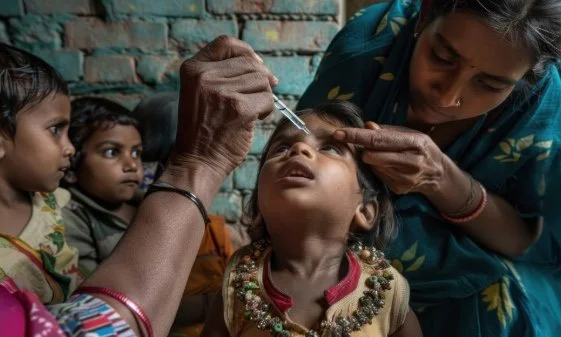India’s Free Healthcare Scheme Failing Patients as Hospitals Go Unpaid, Says Report
Hospitals Are Turning Away Poor Families Having Government Coverage: The Guardian
October 28, 2025
A report by The Guardian warns that delayed payments to hospitals are threatening the functioning of the Ayushman Bharat health insurance scheme. Paired with the lack of basic healthcare infrastructure in many parts of the country, especially in rural and neglected areas, the crisis becomes even more pressing.
The scheme, launched in 2018, promises free medical treatment worth 500,000 (5 lakh) rupees per year per family for low-income households. The coverage includes both government and private hospitals. So far, over 822 million Ayushman Bharat Health Account (ABHA) numbers have reportedly been issued, and nearly 100 million hospital admissions have taken place under the scheme.
The report notes that patients are receiving high-quality care free of cost at facilities that also serve paying clients. However, once treatment is completed, the hospital must seek reimbursement from the government, which has not kept pace with the volume of claims.
According to the newspaper, over 1 trillion (1 lakh crore) rupees in payments are pending across India. Doctors and hospital administrators complain that the payment is sometimes delayed for up to six months, for claims that are supposed to be processed within two weeks. The Indian Medical Association has warned that the scheme’s objective of providing free healthcare to the poor is under threat.
In Haryana, the situation worsened to the point where 650 private hospitals suspended Ayushman services while awaiting 5 billion (500 crore) in unpaid dues, forcing patients to seek treatment elsewhere or pay out of pocket.
The report attributes the payment delays to two main causes. First, hospitals face long waits due to complex paperwork requirements and frequent rejections over minor errors, such as mismatched details or misprints. Second, authorities scrutinise claims to detect fraud, including fake patient entries and inflated bills, which slows down processing further.
Though meant to safeguard the scheme, these measures have led to bottlenecks that affect even genuine claims, leaving hospitals without funds for months.
Apart from the alleged payment delays and fraud‑related scrutiny, limited public healthcare infrastructure also restricts access to care even for those covered by the scheme. As of March 31, 2022, there were 24,935 Primary Health Centre (PHC) in rural India and only 5,480 community health centres, as noted by Pari, citing government data. According to the Rural Health Statistics 2021‑22 from the Ministry of Health and Family Welfare, each PHC in rural India catered to an average of 36,049 people, whereas the relevant Indian Public Health Standards (IPHS) norm is one PHC per 20,000 people in hilly/tribal areas and 30,000 people in plain areas. According to a study published in April 2025, “aspirational (least developed) districts” in nine states had no private hospitals empanelled under the scheme.
For Ayushman Bharat to deliver on its promise, both financial and physical access to care must be assured.
To begin with, the government must strictly enforce time-bound reimbursements. Claims should be processed within the promised two-week period, and any delays must trigger automatic penalties or interest payments to hospitals. This would allow institutions to plan their cash flows and continue offering care without interruption.
Treatment rates under the scheme also need to be revised. Hospitals report that the compensation amounts have not kept up with inflation since 2021, making it financially unsustainable to participate in the programme. Updated pricing packages must reflect the real costs of care, particularly for procedures that require expensive consumables or long hospital stays.
The administrative system handling claims must be simplified. Delays caused by minor errors in documentation or mismatched details can be avoided through better digital systems and support for hospital staff processing large volumes of claims.
The effort to detect fraud must not lead to blanket delays that penalise all facilities.
Finally, the physical reach of the scheme must be expanded. Public investment in district hospitals, community health centres and diagnostics is essential to make Ayushman Bharat meaningful in rural India. Without adequate infrastructure, even a fully reimbursed and efficient insurance scheme cannot deliver care to those who need it most.
You have just read a News Briefing by Newsreel Asia, written to cut through the noise and present a single story for the day that matters to you. Certain briefings, based on media reports, seek to keep readers informed about events across India, others offer a perspective rooted in humanitarian concerns and some provide our own exclusive reporting. We encourage you to read the News Briefing each day. Our objective is to help you become not just an informed citizen, but an engaged and responsible one.

